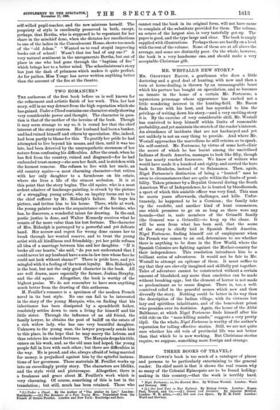TWO TALES OF VILLAGE LIFE.*
MISS COLERIDGE takes us back to that time of ferment, '48. Little indeed of the stir that was agitating Europe had reached the peaceful little village of Ripplehurst. Yet there was movement in the air even there, and especially, as we find, in the family of Matthew Everett. Matthew is an honest, somewhat slow-thinking, sensible peasant, of the best Southern English type. His wife is a shrewd and vigorous woman, seemingly of the most conservative ways of thinking. But she has brought a new element into the Everett character, for she comes from a coast village, of a race in which it was the tradition for at least half of its own sons to be drowned at sea. Here Miss Coleridge finds a theme in which her knowledge of the conditions of English rural life on the one hand, and her literary skill on the other, find appropriate employment. The craving for some life larger than the narrow village borders admit, shows itself in the Everett children. Edward, a clever, well-mannered, handsome lad, has the decorous ambi- tion to become a schoolmaster. Reuben, the real hero of the story, has the longing in a less articulate shape. The railway, then being made in the neighbourhood, excites it. The engine becomes its visible expression. "When that there engine comes, I'd like to drive it as far as it can go," he says to himself. How he struggles to realise this inarticulate longing, how disap- pointment and hope succeed each other, how with a matter- of-fact heroism which is eminently pathetic, he renounces it for duty's sake, and how it finds a fulfilment at last, form the substance of Miss Coleridge's story. We have in it a genuine study of human nature, a subject which, though M. Zola and his friends will not believe us, has at least some aspects which may be viewed without disguise and yet without offence by decent people. One of the most interesting things in the book is the Chartist home, where George Chandler growls at kings and priests, and hopes for a better day to come, when the Charter shall have become the law of the land. Loveday Chandler, the Chartist's daughter, is a pathetic little figure, with her premature womanliness. So, too, in a different way is Susan Morris, the village girl to whom Edward Everett, in days before his ambition took form, had given his heart, and who steadily struggles against her inborn disinclination to the new-fangled ways, to make her- self worthy of the man who loves her.
Miss Yonge's story touches on village life at the point of the school. Here, too, we have a story of revolution of the quiet kind. Brookfield Earl has been contented with the teaching of the old-fashioned "dame." But a hamlet grows up where the pottery folk live, and things have to be changed. The old mistress dies, partly, it is thought, from the worry of an unfavourable inspection, and her successor is a brand- new teacher with the proper certificates, not, as had been expected, "Governess Betsy," who had been put in charge of the infant-school because her husband, the under- keeper, had been killed by an unskilful sportsman at a battue. That is the situation with which Miss Yonge's tale opens, and its subject is the "new mistress's" struggle with the great difficulty of her situation, the narrow conserva- tism of the village, which does not " hold " with new things. It is, indeed. further complicated by her domestic circum- stances, for she has a sister living with her who has been deserted by her husband, and local scandal-mongers do not fail to find an occasion for exercising their craft. The story would have been better, we think, without this element, which takes away from its unity of purpose. It does not belong to Miss Yonge's subject, the lot of a new mistress who has to make her way against hostile influences. Apart from this consideration, we have nothing but praise for Miss Yonge's tale. It is told by two persons, Bertha Hewitt, a
• (1.) Reuben Everett ; or, When Old Things were New. By C. R. Coleridge.— (2.) Our New Mistress ; or, Changes at Brookfield Earl. By C. M. Yonge. London National Society. MSS.
self-willed pupil-teacher, and the new mistress herself. The propriety of style is excellently preserved in both, except, perhaps, that Bertha., who is supposed to be repentant for her share in the mischief done, when she dictates her recollections to one of the ladies in the Convalescent Home, shows too much of the "old Adam." "Wanted us to read stupid improving books out of school ! Wasn't that too bad of any one ?" A very natural sentiment in the unregenerate Bertha, but out of place in one who had gone through the "baptism of fire" which brings her to a better mind. The schoolmistress's story has just the dash of primness which makes it quite perfect. As for pathos, Miss Yonge has never written anything better than the account of the fire at the theatre.



















































 Previous page
Previous page